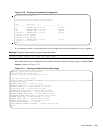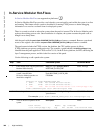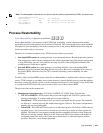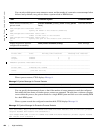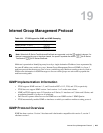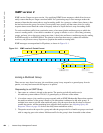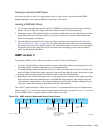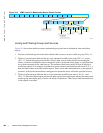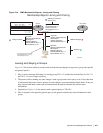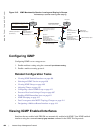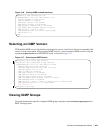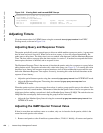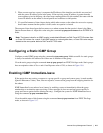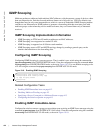
Internet Group Management Protocol | 405
Sending an Unsolicited IGMP Report
A host does not have to wait for a general query to join a group. It may send an unsolicited IGMP
Membership Report, also called an IGMP Join message, to the querier.
Leaving a Multicast Group
1. A host sends a membership report of type 0x17 (IGMP Leave message) to the all routers multicast
address 224.0.0.2 when it no longer cares about multicast traffic for a particular group.
2. The querier sends a Group-Specific Query to determine whether there are any remaining hosts in the
group. There must be at least one receiver in a group on a subnet for a router to forward multicast
traffic for that group to the subnet.
3. Any remaining hosts respond to the query according to the delay timer mechanism (see Adjusting
Query and Response Timers on page 410). If no hosts respond (because there are none remaining in
the group) the querier waits a specified period, and sends another query. If it still receives no response,
the querier removes the group from the list associated with forwarding port and stops forwarding
traffic for that group to the subnet.
IGMP version 3
Conceptually, IGMP version 3 behaves the same as version 2. There are differences:
• Version 3 adds the ability to filter by multicast source, which helps multicast routing protocols avoid
forwarding traffic to subnets where there are no interested receivers.
• To enable filtering, routers must keep track of more state information, that is, the list of sources that
must be filtered. An additional query type, the Group-and-Source-Specific Query, keeps track of state
changes, while the Group-Specific and General queries still refresh existing state.
• Reporting is more efficient and robust: hosts do not suppress query responses (non-suppression helps
track state and enables the immediate-leave and IGMP Snooping features), state-change reports are
retransmitted to insure delivery, and a single membership report bundles multiple statements from a
single host, rather than sending an individual packet for each statement.
The version 3 packet structure is different from version 2 to accommodate these protocol enhancements.
Queries (Figure 19-2) are still sent to the all-systems address 224.0.0.1, but reports (Figure 19-3) are sent
to the all IGMP version 3-capable multicast routers address 244.0.0.22.
Figure 19-2. IGMP version 3 Membership Query Packet Format
fnC0070m
p
Type
(0x11)
Max. Response
Code
Group Address
Checksum
C
ode: 0x11: Membership Query
Maximum Response Time
derived from this value
Reserved
S
Querier Robustness
Value
(2)
Querier's Query
Interval Code
Number of
Sources
Source Addresses
Bit flag that when set to
1 suppresses router query
response timer updates
Number of times that a
router or receiver transmits
a query or report to insure
that it is received
Query Interval derived
from this value
Number of source addresses
to be filtered
Source addresses to be
filtered



